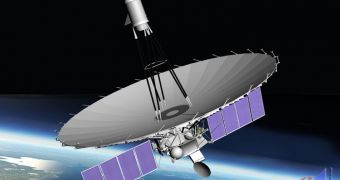Since the launch of the Russian Spektr-R radio telescope coincided with the retirement of the American space shuttle, numerous news outlets used this opportunity to publish articles arguing why the US space program is going downhill. Experts say that comparing the telescope to Hubble is useless.
The Hubble Space Telescope has been the flagship telescope at NASA since 1991. Nearly everyone has heard about it, even if only in passing. Its photos adorn every science manual from Asia to Africa and America, and its contributions to understanding the Universe are more than obvious to anyone.
But somehow the instrument made it inside comparison charts that media outlets put together in order to prove whatever point they were trying to make. Given the advanced specifications of the Spektr-R observatory, the two were automatically compared.
First and foremost, the European Space Agency (ESA) launched the Herschel Space Observatory in 2009. This is the most advanced orbital telescope ever built, and no one appeared to have a problem with it, or compare it to Hubble. Why? Because they are telescopes of different class.
However, the same restraint was not practiced when Spektr-R launched, on July 18. The event took place around the same time the space shuttle Atlantis returned from its STS-135 mission to the International Space Station (July 21).
Given that news editors were obsessed with the retirement of the orbiters, they began to make comparisons between NASA's future and policies and those of the Russian Federal Space Agency (RosCosmos), which finally managed to launch Spektr-R after a decade of delays.
Comparing a near-infrared/visible-light/ultraviolet telescope like Hubble to a radio astronomy observatory like the Russian spacecraft is out of place, since the two don't even compete in the same wavelength ranges, Universe Today reports.
The two observatory will produce/continue to produce very different results. While Hubble will continue its 21-year career, Spektr-R will be arrayed with Earth-based radio telescopes, and conduct studies at a scale that has never been achieved before.
At this point – other than Herschel – the James Webb Space Telescope is the only contender that could challenge Hubble's domination in space. However, the JWST is a NASA telescope as well.

 14 DAY TRIAL //
14 DAY TRIAL //